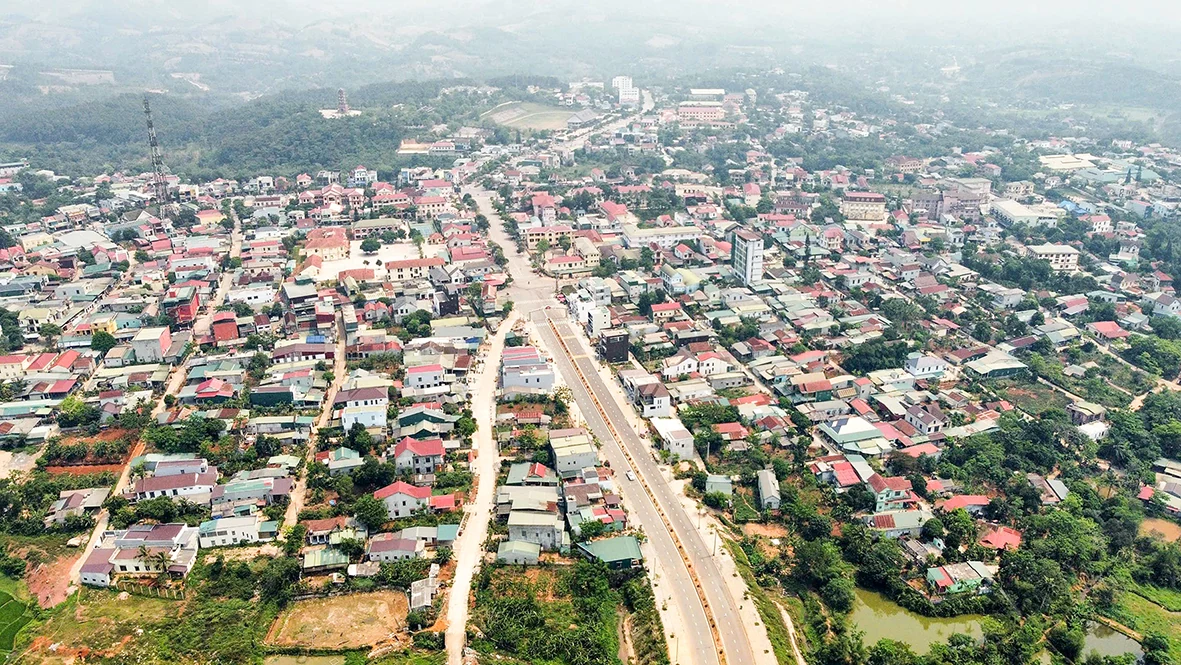{title}
{publish}
{head}
Identifying digital transformation as a key solution for promoting comprehensive development across various socio-economic sectors, Huong Hoa district has recently intensified its efforts by implementing a range of measures. The focus has been on developing the digital economy, digital society, building e-government, and smart cities, with the goal of transitioning to digital governance.
To promote digital transformation, the People’s Committee of Huong Hoa District has directed the establishment of community-level digital technology teams at the commune and village levels. All 21 communes and towns in the district have formed such teams at the commune level, and all 149 villages and residential areas have established teams at the village level, with a total of 1,020 members. These teams are the core force responsible for disseminating information and promoting digital transformation to the local population.

Huong Hoa is developing rapidly thanks to digitalization. Source: L.A
The application of information technology (IT) within state agencies in the district has seen positive developments. To date, 100% of agencies, units, and the People’s Committees of communes and towns are using document management and work record software. Alongside the development of IT infrastructure and human resources, many IT applications have been widely deployed across state agencies, particularly in managing, sending, and receiving documents online from district to commune levels.
All documents are processed online, and 100% of agencies, units, and People’s Committees of communes and towns have effectively implemented the use of specialized digital signatures within state activities. The district provides 238 online public services (111 partial online services, 127 fully online services), while commune-level committees offer 124 online public services (61 partial, 63 fully online). All online services have been integrated into the National Public Service Portal.
Several specialized databases have been integrated with provincial, ministerial, and central databases, such as the socio-economic information system, which is now connected, integrated, and shares digital data with the Government Reporting System. The district has expanded its online meeting platform, and the district’s video conferencing system is operational with one hub at the Office of the People’s Council and the People’s Committee and 21 hubs at the commune and town levels. Platforms for citizen identification and electronic authentication, vaccination management, and electronic health records have also been implemented across the district. Additionally, the district has developed platforms for e-commerce, healthcare databases, education databases, personnel databases, and databases for labor, war invalids, and social affairs, among others.
The district’s information, postal, and telecommunications infrastructure has steadily developed, ensuring communication for leadership and administration, while actively supporting national defense, security, and significant events. Currently, the district has 19 postal culture points, one postal office, six postal delivery points, and 25 points providing mobile telecommunications devices.
In terms of telecommunications infrastructure, three network operators (VNPT, Viettel, Mobifone) are active in the district, operating a total of 150 mobile broadcast stations. All communes and towns in the district are covered by 4G and 5G internet services, and 136 out of 149 villages are covered by 4G and 5G mobile networks, accounting for 91.2%. Telecommunications companies have focused on developing modern and comprehensive telecommunications infrastructure, extending coverage to remote areas. At the same time, network and service quality has continuously improved, with new services introduced to meet the diverse information needs of the population.
To develop human resources, the district has organized four training courses on digital transformation and information security skills for civil servants from communes, towns, and community digital technology teams, with nearly 200 participants. In collaboration with Hue University, 14 training courses were held for residents on applying IT in production and business activities, with over 800 participants.
Over the past year, district and commune-level civil servants have participated in digital transformation and information security training courses organized by the province. All 21 communes and towns have appointed personnel responsible for digital transformation and information security. Civil servants regularly update their knowledge on information security and IT applications.
In developing the digital economy and society, the district has supported local agricultural products in entering e-commerce platforms such as Voso and Postmart. The products, which are certified OCOP products, are varied in design and packaging and meet requirements for labeling, packaging, and traceability.
Electronic payments have been promoted, making it easier for residents and businesses to engage in cashless transactions. More than 60% of schools, educational institutions, hospitals, and healthcare facilities in the district have adopted cashless payment methods. All 21 communes and towns have digitized administrative procedures by attaching QR codes to notice boards and websites for easy access.
Building on these achievements, the district will continue urging state agencies and commune-level People’s Committees to upgrade IT equipment. The effectiveness of community digital technology teams will be enhanced to better fulfill their roles in digital transformation and promoting online public services.
Efforts will also be made to raise awareness of IT, digital skills, and information security among the population. Telecommunications companies will be encouraged to expand infrastructure in areas lacking mobile network coverage. Surveys and studies will be conducted to upgrade telecommunications and transport infrastructure to meet the demands of the Fourth Industrial Revolution. Support for small and medium enterprises in their digital transformation efforts will be increased, along with initiatives to promote digital citizenship.
The district will continue reviewing administrative procedure files and solutions to ensure they are digitized and restructured in accordance with legal requirements, providing fully online public services. Regular monitoring will ensure progress meets provincial targets, and any necessary adjustments will be implemented to maintain or accelerate local progress.
In 2022, the People’s Committee of Quang Tri province approved the province’s Digital Transformation Plan, aiming for 2025 with a vision toward 2030. The province has made significant investments in information technology infrastructure.
Quang Tri has placed a strong emphasis on developing digital governance. Government inspections are increasingly being conducted through digital platforms and management information systems. The province’s online public service portal is now interconnected with the national population database. Currently, the portal offers 1,126 fully online public services (level 4).
One of the key focuses of Quang Tri’s digital transformation efforts is narrowing the digital divide by fostering a digital society. Broadband fiber optic infrastructure now covers over 80% of households and all communes in the province. Mobile networks, including 4G and 5G services, along with smartphone usage, are steadily expanding. Approximately 65% of the population now holds payment accounts.
These efforts have contributed to notable progress in digital transformation across the province. In Quang Tri’s Digital Transformation Index (DTI), digital infrastructure ranks 19th, digital institutions 23rd, and digital governance 38th.
Le An - Ngoc Mai

QTO - In Quang Tri, clean agricultural stores may not flaunt flashy signs or wide storefronts, but they are quietly becoming trusted places where consumers...

QTO - In a quiet village in central Vietnam, Le Minh Duc, 26, has turned his passion for ornamental fish into a promising startup, the first Koi breeding...